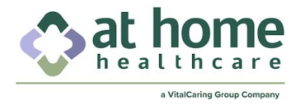Account Number: A unique number that is assigned to your At Home Healthcare record.
Adjustment: A portion of your bill that is adjusted in accordance to the contract between At Home Healthcare and your insurance company.
Allowed Amount/Amount Payable: The amount your insurance plan pays or covers for your care, less any deductibles, coinsurance, or charges for non-covered services.
Amount Not Covered: The bill amount that the insurance company will not pay. It may include deductibles, coinsurances, and charges for non-covered services. This amount is due from the guarantor.
Benefit Limitations: Your insurance plan may limit the dollar amount or number of services it will pay for certain treatment or services, or for all benefits provided in a benefit period.
Coinsurance: The percentage of coverage not covered under your insurance benefits. For example, your policy may cover 80% of charges. Your coinsurance/patient portion would be the remaining 20%. This amount is due from the guarantor.
Co-payment/Co-pay: A set fee established by the insurance company for a specific type of visit. This amount is due from the guarantor.
Date of Service (DOS): The date(s) when you were provided healthcare services.
Deductible: An amount that must be met on an annual basis that is established by the insurance company and your benefit plan. Call your insurance company for the most up-to-date information regarding your deductible.
Deposit: At Home Healthcare requires a payment due upon admission equal to total charges, any applicable deductible or coinsurance as determined by your insurance company. (See Financial Policy in Start of Care Guide for more information.)
Explanation of Benefits (EOB): A notice you receive from your insurance company after your claim for services has been processed. It explains the amounts billed, paid, denied, discounted, uncovered, and the amount owed by the patient. The EOB may also communicate information needed by the insured in order to process the claim.
Guarantor: The person responsible for payment of the bill.
Health Maintenance Organization (HMO): An insurance plan that has contracted with providers to provide healthcare services at a discounted rate. These services will require prior pre-certification, authorization, and/or referrals.
Managed Care: An insurance plan that has a contract agreement with hospitals, physicians, and other healthcare providers. These services may require prior pre-certification, authorization, and/or referrals.
Non-Covered Services: Services not covered under the patient’s insurance plan. These charges are the patient’s responsibility to pay.
Out-of-Network Provider/Non-Participating Provider: The provider is not part of the insurance plan’s network of contracted providers. Generally, services at out-of-network providers are paid for at a lower rate by the insurance plan and at a higher rate by you.
Out-of-Pocket Costs: The amount that you pay until your insurance benefit coverage reaches 100%.
Pre-Authorization Number: Authorization given by a health plan for a member to obtain services from a healthcare provider. This is commonly required for home health & home support services. This is not a guarantee of payment.
Preferred Provider Organizations (PPO): An insurance plan that has a contract with providers to provide healthcare services at a discounted rate. These services may require prior pre-certification, authorization, and/or referrals.
Subscriber: The person responsible for payment of premiums or whose employment is the basis for eligibility for a health plan membership.




